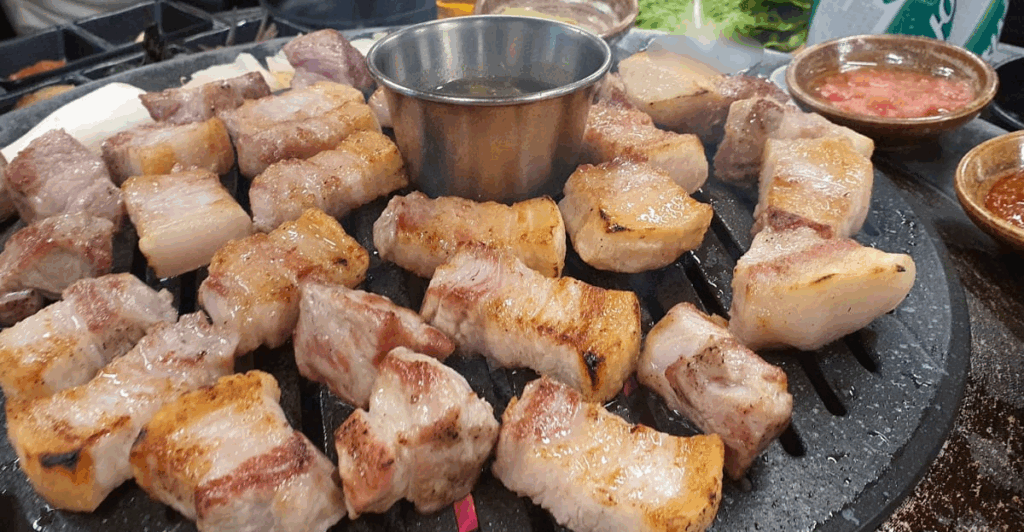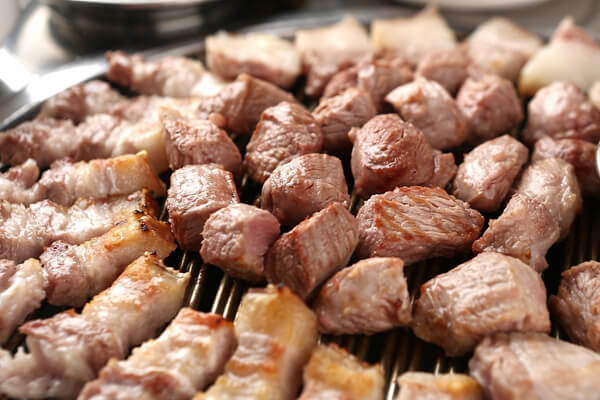One of the must-try dishes when visiting Jeju Island is undoubtedly “Jeju Black Pork.” This native (or crossbred) breed is known for its distinct black hair, unlike standard white pigs, and its uniquely chewy texture and rich, fatty flavor make it truly exceptional. Thanks to its nutty and deep flavor, once you taste it, you’ll find yourself saying, “Nothing beats Jeju’s black pork!” In this post, we’ll introduce you to some of the can’t-miss black pork restaurants on Jeju Island and share tips on how to fully enjoy a satisfying meal.
Characteristics and History of Black Pork
The native black pigs of Jeju are believed to have been raised freely in the island’s harsh natural environment. They used to roam freely around the villages, and there was even a unique farming tradition involving pig pens combined with traditional toilet structures. Although such methods are rarely seen today due to modern hygiene and quality control standards, black pork has long been considered a vital protein source for the people of Jeju.
While the black pork that we commonly enjoy today may not be 100% purebred, it’s widely noted for its shorter black hair and especially savory meat compared to ordinary pork. When grilled to a crisp on the outside, the leaking juices offer arguably one of the most mouthwatering moments—rightly earning black pork its place as the “king” of grilled pork dishes.

Downtown Jeju City: Black Pork Street
In downtown Jeju City, there’s an alley popularly known as “Black Pork Street,” which gets packed during dinner hours with tourists seeking a pork BBQ feast. Most restaurants in this area prefer grilling meat over charcoal or stone slabs and often offer unique local twists—like serving it with hallabong sauce or Jeju sea salt.
When you order black pork belly or shoulder, the meals typically come with a large brazier and a spread of side dishes. Jeju’s kimchi, known for its refreshing flavor, pairs beautifully with the meat. While every restaurant has its own style, most emphasize thick-cut meat as a highlight. Once grilled and thinly sliced for eating, the way the juices burst with each bite will remind you how different it is from any pork belly you’ve ever had elsewhere.
Near Dongmun Market: Market Tour & Pork House Crawl
Dongmun Market is one of Jeju’s most famous traditional markets, and its surrounding area also boasts countless black pork restaurants. A popular route for visitors involves walking through the market to check out local specialties like tangerines, tangerine chocolates, and dried tilefish—then heading straight to a nearby restaurant for black pork BBQ.
One perk of dining near the market is that these restaurants typically open early in the evening, so it’s easy to grab a meal once your market stroll works up your appetite. You can also snack on items like fish cakes or noodles in the market to hold you over until dinner. If your itinerary is packed, using this centrally located area as your travel base can help maximize your schedule while still enjoying Jeju’s local flavors.
Aewol and Hyeopjae: Beach Views with Black Pork
The western coastal regions of Aewol and Hyeopjae are famous for their stunning sea views, with plenty of trendy cafés and restaurants. It’s also easy to find great black pork eateries here. Grilling meat while watching the sunset over the ocean feels like something out of paradise—offering a richly relaxing and romantic experience.
Several restaurants in Aewol boast wide-open sea views, and after your meal, you can stop by a scenic café for dessert. Around Hyeopjae Beach, you can enjoy a day at the beach, shower off, and then head straight for dinner. This region satisfies both your craving for pork and your love of the sea, so if you’re planning a trip to western Jeju, this area is well worth a visit.
Seogwipo and Jungmun: Combining Sightseeing with a Great Meal
Seogwipo is a naturally beautiful area filled with top tourist spots like Jungmun Resort, Cheonjiyeon Waterfall, and Jeongbang Waterfall. With so many visitors, it’s no surprise that black pork restaurants can be found in abundance. Many places near the Jungmun Resort complex are spacious and cleanly designed, offering large seating areas perfect for families or tour groups.
Some restaurants in this area also serve horse meat, seafood, or squid dishes alongside black pork. If you want to sample a variety of Jeju’s local cuisine in one meal, you can opt for a course menu that combines pork and seafood. Enjoying the aroma of juicy grilled pork while gazing at Seogwipo’s beautiful blend of mountains and ocean is truly one of the highlights of any trip to Jeju Island.
Must-Try Side Dishes: Meljorim and Gosari Yukgaejang
Don’t forget to pair your black pork barbecue with some local side dishes. For example, meljorim is a savory-sweet dish of simmered baby anchovies that perfectly complements the richness of the meat. While pork may be the star, the delicate interplay between main dishes and side dishes is what makes Korean cuisine special.
Another regional favorite is gosari yukgaejang, a spicy beef and bracken fern soup. Made with bracken grown near Hallasan Mountain, the broth is both hearty and flavorful, easily going down even after a big meal. If black pork is the main attraction, then pairing it with yukgaejang or meljorim is a delicious way to wrap up the feast.
Tip: How to Properly Grill Thick-Cut Pork
The key to enjoying black pork is proper grilling. Thick-cut slices should be seared quickly over high heat at first to lock in the juices, then cooked more slowly on a lower flame to evenly heat the inside. Some restaurants will grill it for you, but if you’re doing it yourself, try not to flip the meat too often. Let each side develop a nice brown crust for the best flavor.
With pork belly in particular, the fat can cause flare-ups, so be mindful of the flame. If grease starts dripping into the fire, move the meat to the edges of the grill or stone plate rather than the center. Cut the cooked pork into bite-sized pieces and keep it at an ideal temperature for eating. When you take that perfectly grilled bite of black pork, you’ll feel that experiencing Jeju was truly worth it.
Conclusion: Jeju’s Flavors Come Alive Through Black Pork
Jeju is an island blessed with rich natural beauty and a unique culinary identity. Among its many local specialties, black pork stands out as a must-have gourmet experience that leaves a lasting impression on any visitor. Whether you’re in Jeju City, Seogwipo, Aewol, or Hyeopjae, delicious black pork restaurants are everywhere—so be sure to try at least one during your trip.
Take it a step further—strike up a conversation with the restaurant owner or a staff member. You might uncover behind-the-scenes stories or cooking tips that enhance your appreciation. A single slice of black pork—raised under Jeju’s winds and sun—along with the fusion of Jeju’s local flavors, becomes a rich memory that’s nearly impossible to recreate elsewhere.


K-Name Studio: Create your perfect Korean name based on your personality and style.
What’s My K-Beauty Personal Color?
WeBring Service : Provides personalized services to foreigners living in Korea
Exclusive offer: Introducing foreign car rental in Korea, WeBring-SoCar

